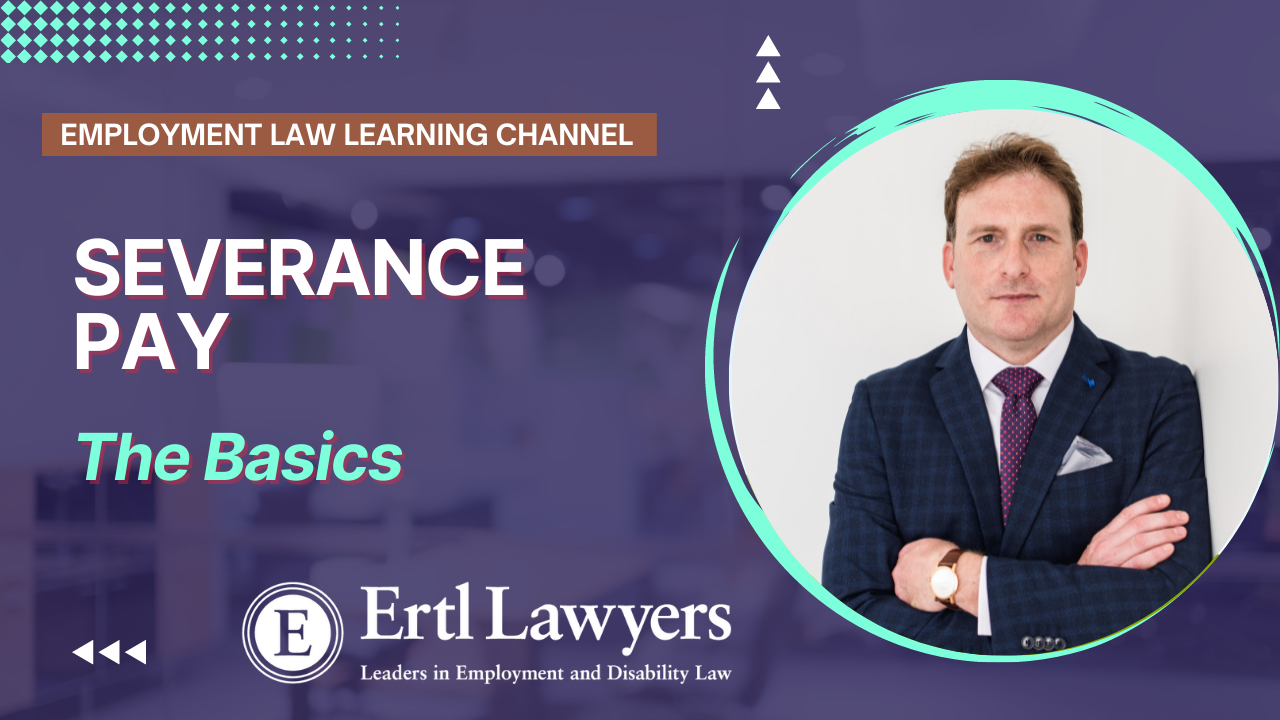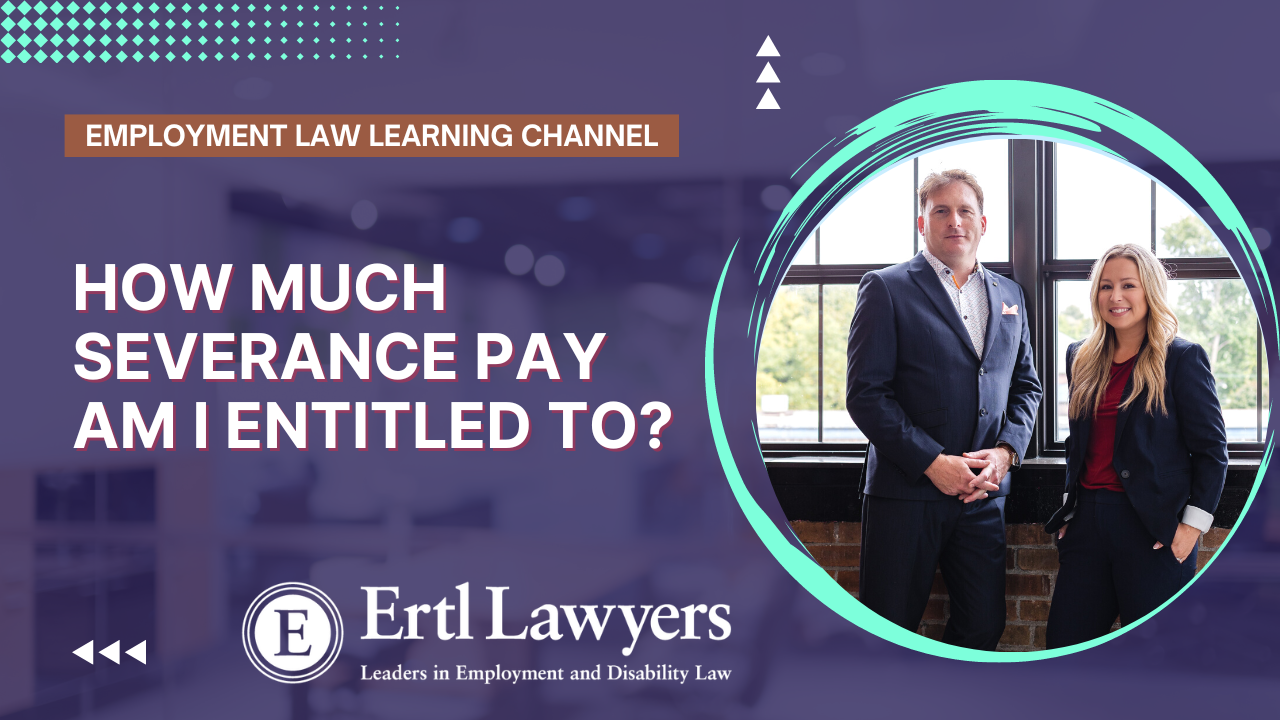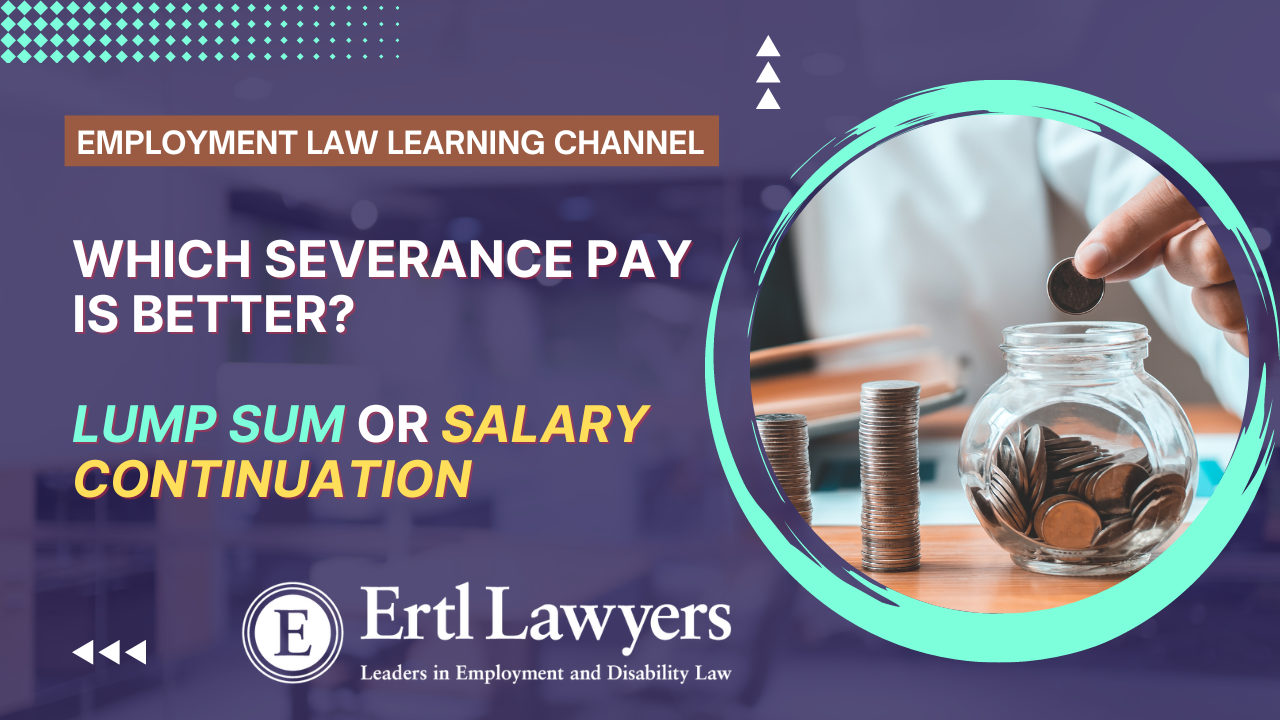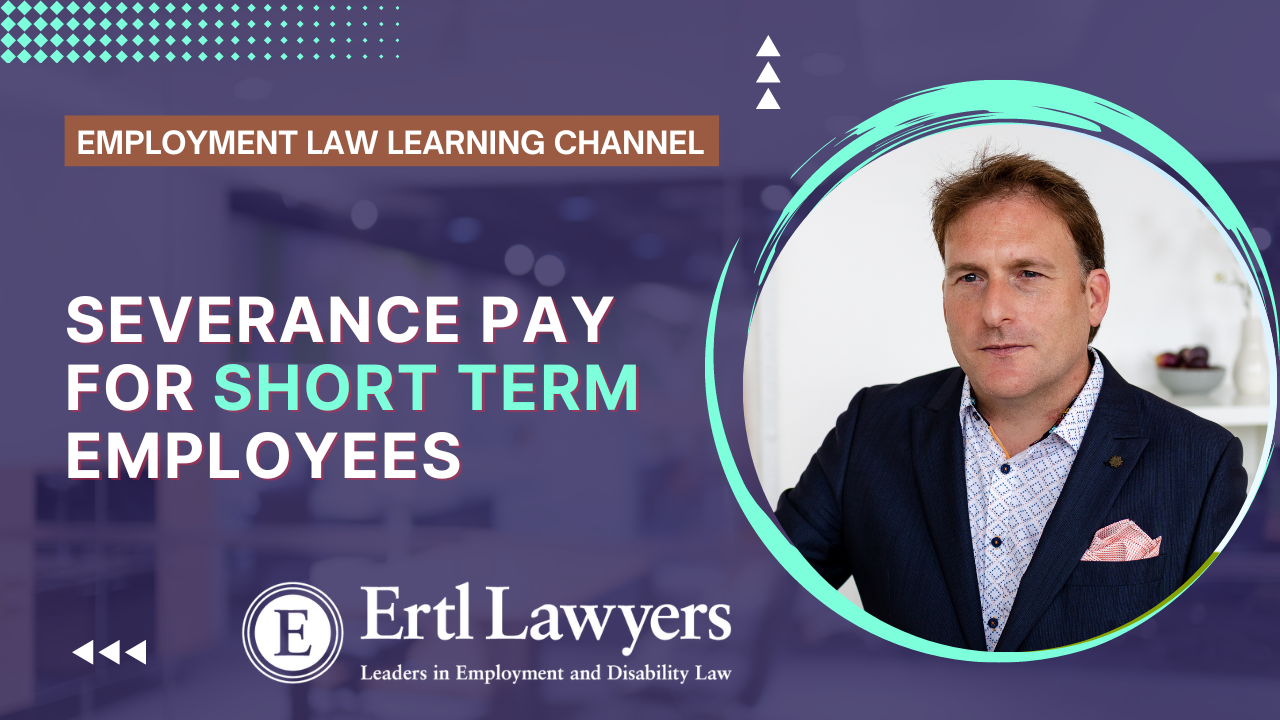Severance Pay in Nova Scotia
How Much is Severance Pay in Nova Scotia?
In Nova Scotia, if you are a non-unionized employee, you are generally entitled to severance pay if you have been fired without cause (i.e., no fault of your own).
When employees are terminated, they receive working notice, severance pay, or a combination of both.
The amount of severance pay in Nova Scotia varies from person to person and can be as low as one week’s pay up to a maximum of about 24 months of pay.
Ertl Lawyers offers employment law services across Nova Scotia, including Halifax, Dartmouth, Truro, New Glascow, Glace Bay, Kentville, Amherst, Bridgewater, Enfield, Antigonish, and Cape Breton-Sydney.
We’ve negotiated thousands of severance packages and recovered millions in severance pay for our clients.
Consult with us today to learn what you are entitled to.
How is Severance Pay in Nova Scotia Calculated?
The amount of severance pay you should receive in Nova Scotia is determined by Nova Scotia’s Labour Standards Code and the common law.
Severance Pay in Nova Scotia (under the Labour Standards Code)
Nova Scotia’s Labour Standards Code guarantees you the MINIMUM amount of severance pay, calculated according to this formula:
| Service Length | Amount Notice/ Pay in Weeks |
| Three months to less than two years | 1 |
| Two years but less than five years | 2 |
| Five years but less than ten years | 4 |
| Ten years or more | 5 |
Severance Pay in Nova Scotia (under the Common Law)
“Common law” refers to the body of law that makes up our court system.
Whereas Nova Scotia’s Labour Standards Code provides for minimum amounts of severance pay, the common law determines a person’s maximum entitlements.
Under the common law, the maximum severance pay in Nova Scotia is about 24 months.
The critical case courts rely on to determine proper severance pay in Nova Scotia is Bardal v. Globe & Mail Ltd. It says that the amount of severance pay must be based on a variety of personalized factors, including:
- your age at the time of your termination
- your length of service
- the character of your employment (i.e., the type of job you had)
- availability of comparable jobs in the marketplace
Those are the main factors, but there are many more, including:
- whether you were induced to leave secure employment
- your health
- disabilities you might have
- a poor economy
- specialized role
- limited skills/training
- the manner of your dismissal
A quick way to calculate/estimate your severance pay in Nova Scotia is to try our Severance Pay Calculator.
Is Severance Pay in Nova Scotia Mandatory?
With limited exceptions, when an employee is terminated without cause, Nova Scotia companies must provide advance written notice of your termination or pay instead of that notice (called severance pay).
Your employer must provide the MINIMUM notice or severance pay as prescribed by the Nova Scotia Labour Standards Code – and more if the employee has a common law entitlement to even greater severance. The size of the company does not matter.
Federally regulated employees (such as employees who work for banks, airlines, etc.) are governed by the Canada Labour Code, which has its own formula for severance pay.
Whether an employee has a common law entitlement to more severance may not be evident to someone terminated. For that reason, you must contact us.
What is the Minimum Severance Pay in Nova Scotia?
The Labour Standards Code sets the minimum severance pay in Nova Scotia. Section 72 of the Labour Standards Code sets out a formula for calculating the minimum amounts of severance pay based solely on a person’s length of service.
What is the Maximum Severance Pay in Nova Scotia?
The maximum severance pay in Nova Scotia is determined by the common law, based on variables including age, length of service, type of job you had, and the availability of similar jobs in the marketplace.
With rare exceptions, the maximum severance pay in Nova Scotia is about 24 months.
What Should Be in My Severance Pay Package?
A complete severance package should consist of all forms of compensation you would have earned had you continued to work for your employer, including:
Salary
This should be the salary you earned at the time of your termination. The common law would also consider any salary increases before you were expecting.
Commissions
Absent any contractual language to the contrary, you should be entitled to commissions that you earned (but were not paid) before your termination. You should also be entitled to the commissions you would have earned in the future.
Bonus
Absent any contractual language to the contrary, you should be entitled to bonuses you earned (but were not paid) before your termination. You should also be entitled to the bonuses you would have earned in the future.
Benefits
The employer should continue your benefit plan for the prescribed minimum period (somewhere between one and eight weeks). The common law, however, would demand that the employer continue your benefits for the full duration of the proper notice period. For example, if you are entitled to six months of severance, the benefits should be continued for six months, too.
Other Perqs
Generally speaking, the common law would also demand that the employer provide compensation instead of such things as car allowance, cell phone, gym memberships, employee discounts, etc.
If I Quit, Am I Entitled to Severance Pay in Nova Scotia?
You might be entitled to severance pay in Nova Scotia if you quit for a good reason. For example, if you believe you were constructively dismissed, you might still have an entitlement to severance pay.
Common examples of constructive dismissal include a reduction in pay, a demotion, a reduction in responsibility, a geographic transfer, etc.
Otherwise, if you resign without a good reason, you are not generally entitled to severance pay in Nova Scotia.
Consult with Ertl Lawyers if you are contemplating quitting your job and think you have been constructively dismissed. This is a complex area of the law.
How Does My Employment Contract Affect My Severance Pay in Nova Scotia?
If your employment agreement has a termination provision, it might spell out precisely what you are entitled to at termination.
Caution: For various technical reasons, these termination provisions are not enforceable. It is highly recommended that you contact us to have us review your employment agreement to determine your severance pay in Nova Scotia entitlements.
How Is Written Notice or Pay in Lieu in Nova Scotia Provided?
Working Notice
People don’t like to hear this, but the employer can provide “severance” in the form of working notice. For example, if you were entitled to three months of severance, the employer could make you work those three months instead of paying you a lump sum or providing salary continuation.
Lump Sum
Severance pay in Nova Scotia can be paid out all at once. This is called “lump sum”.
Salary Continuation
Sometimes, severance pay is paid as if you were still working there. You still get regular paycheques but don’t report to work.
People don’t like to hear this, but the employer can provide severance in the form of working notice.
Combination
An employer could combine working notice, lump sum, and salary continuation.
Is Severance Pay Taxable in Nova Scotia?
Yes. Severance pay is income, so it is taxable in Nova Scotia.
That said, there are differences in how a lump sum is paid vs. salary continuation.
With a lump sum, it is categorized as a “retiring allowance” under the Income Tax Act. The employer will withhold a portion of the gross amount under set rates. It will remit that percentage to the government. You get the rest. There are no deductions for E.I. or CPP.
With salary continuation, it’s as if you received pay cheques during the normal course. Federal and provincial taxes, E.I., CPP, etc., are deducted from your pay.
Severance Pay and E.I.
If you receive severance pay (statutory, common law, or both), it must be reported to the government. After all, severance pay is considered income.
Although you can (and should) apply for E.I. as soon as you are terminated, you won’t receive E.I. until your severance “runs out”.
Further, if you are already receiving E.I. by the time you negotiate a severance package, the E.I. you received will have to be paid back by you. The good news is that once the E.I. is paid back, your entitlement to E.I. is “re-set”.
Should I Go to the Department of Labour, Skills and Immigration for Severance Pay?
The Department’s job is to apply and enforce the MINIMUM standards under the Labour Standards Code.
It cannot get you more than the minimum.
It cannot get you greater common law severance pay.
Always consult with an experienced employment lawyer before making a complaint to the Department about severance pay.
How Long Do I Have to Claim for Severance Pay in Nova Scotia?
The law imposes a two-year time limit for you to pursue common law severance through the courts. There are some exceptions. Don’t wait to contact a lawyer. You could be giving up your rights.
If you are making a complaint to the Department of Labour, Skills and Immigration, there is currently a 6-month deadline to make a complaint. But, again, this may not be your course of action. Contact us before you make any decisions.
How Do I Get More Severance Pay in Nova Scotia?
The best way to get more severance pay in Nova Scotia is to consult an experienced employment lawyer.
If you have a case, the lawyer will first attempt to negotiate with your ex-employer.
If negotiations are not successful, you have the option of commencing a legal claim.
Please don’t worry. Less than 1% of wrongful dismissal matters ever see the inside of a courtroom.
Should I Hire a Severance Pay Lawyer?
In our experience, employees who attempt to negotiate themselves almost always leave something on the table. They might get a few extra weeks of pay. Almost without exception, an experienced employment lawyer will get a far better package for you.
Read more: read our reviews.
How Much Do Severance Pay Lawyers Cost?
Severance pay lawyers will charge either a contingency fee (a percentage of the improvement in your offer), a flat / fixed fee, or by the hour.
During our free consultation, we will set out how much we think your matter will cost.
Severance Pay Calculator
Our severance pay calculator can give you an idea of how much your severance should be.

David Ertl negotiated a huge increase in my severance package, including an extension of my health benefits. It provided me peace of mind while I searched for another job. Thanks David!
– C.M., Transportion Industry, Halifax
Need Expert Help With Your Severance Pay in Nova Scotia?
When you contact us for a free consultation, we will thoroughly review your matter. We’ll tell you whether we believe you’re entitled to more severance pay than what your ex-employer is offering. We will also discuss expectations, timing, and costs with you. Our consultation is 100% comprehensive. It is designed to give you the information you need to make the best decision possible.
Employers and their legal counsel know that Ertl Lawyers are well-prepared to fight for our clients, which is why the majority of our matters are successfully negotiated without even having to start a legal claim.
We’d like to help you too. And, we believe that our help can make all the difference.
Related Blogs
Parental Leave in Ontario – Frequently Asked Questions
Parental Leave in Ontario - Frequently Asked Questions Author: David Ertl, Employment Lawyer What is parental leave? In Ontario, parental leave is an absence from work commencing after the baby is born. Section 48 of the Employment Standards Act, 2000 explains who is...
Employment Law: Constructive Dismissal – The Basics
Constructive Dismissal - The Basics Author: David Ertl, Employment Lawyer Constructive dismissal occurs when the employer decides to no longer be bound by the contract in place with the employee and makes a unilateral, fundamental change to the employment...





